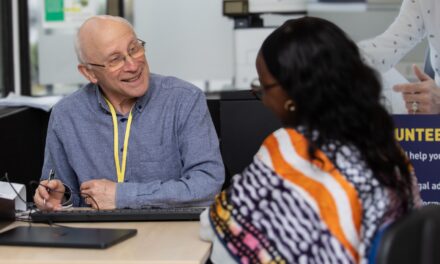In the month of November we take a moment to shine a spotlight on men’s mental health. Whilst mental illness affects people of every gender, men can often end up suffering in silence. With societal pressures and expectations of what it ‘means to be a man’, statistics tell us that it is a wide reaching and devastating issue. 12.5% of men in England and Wales are reported to suffer from a mental disorder, men are three times more likely to die by suicide than women, and suicide remains the leading cause of death amongst men under 50. To support that spotlight, the Hall Committee, throughout November, will be drawing on the experience of some of its members, who will share their own mental health journeys, to highlight just how common this issue is and for us all to gain strength from the sharing.
Who am I?
I am Chris Bates. I am currently the Chair of the Middle Temple Hall Committee. I practice in public law and like to euphemistically call myself a ‘human right’s lawyer.’ I completed pupillage in a common law set, though pretty much exclusively practised in criminal defence. I am a father to a wonderful little boy.
That is who I am. Alongside that, I also am a person with autism and dyslexia. I also regularly battle with both depression and anxiety. I’m not on any medication but I see a therapist once a month and have done for just over two years.
My Mental Health Journey
My battle with mental health has been one I have faced most of my adult life. I am 31 years old, and my first experience with depression, like I think for many people, arose from university. Though I graduated with a 2:1, I spent the year following my graduation ‘recovering’ before I started the Bar course (BPTC as it was then). I have put recovering in inverted commas as now, with the benefit of age, experience and therapy, I have realised that despite getting myself back on an even kilter, this first bout with mental illness, and the way I coped with it, set the tenor for battles that would come back at regular instances.
Through this experience, looking back, I realised that I created some very unhealthy coping mechanisms and modes of thinking. I became incredibly self-critical and judged myself very harshly, blaming myself for things that I could never have changed, damning myself in a harmful cycle of setting unreasonable standards then blaming myself for failing to achieve the unachievable. And rather than addressing the hurt and pain that lay beneath all that, I shut it down and locked it out.
Unsurprisingly, a lot of this came back when I faced the challenges of pupillage. Many of us will be familiar with the collection of challenges that pupillage creates and I was no stranger to it. The actual pressure that pupils are placed under, even in the most supportive sets, paled in comparison to the pressure I placed on myself. And yes, it wasn’t all me, there were other things going on that contributed to me once again falling into a hole of depression, this time, with anxiety just to add a little bit of extra spice into the mix.
One of the worst things that I did though was I isolated myself. I put up the walls to people around me and pushed on. Given the challenges I was facing, this went exactly as you would expect. It was at this point I had what I generally refer to as ‘my big breakdown’ and I made the decision to leave the Bar. I can remember pretty much the exact moment, in the pouring rain outside Westminster Magistrate’s Court after a particularly gruelling day I was stood there thinking to myself, ‘I can’t do this anymore’ and I can still recall the feeling of something snapping inside of me.
Around the same time, my son was born. I love being a dad, and would never change that for a second. But for those of you who are parents, you will know that it can bring its own host of challenges. Mine came in the form of post-natal depression. Its not something that as a society we talk about, or are aware of the fact it impacts men, but it does. In my anti-natal group, we were hit with the statistic that one in 14 fathers will be affected by post-natal depression. I looked round the group and counted each person, all the way up to 14. The group leader said ‘one of you will be impacted by it so reach out for help’.’ And when it came for me, I was already isolated, already cut off, so I cut myself off even further and again set myself those unhealthy standards and adopted an internal dialogue that was utterly toxic.
Taking these two things together, I was mentally battered and bruised. I struggled to get up in the morning, struggled to engage with anything and the symptoms of anxiety and depression really took hold.
It took me nearly three years to get to a place where I could return to the Bar, which when I left, was something I never thought would happen. That is not to say that I still don’t struggle with my mental health. But now, I have much more emotionally healthy coping mechanisms, I am more open about my struggles with the people in my life, and I have started to deal with some of the underlying issues, that over a decade on from when the first arose, still impact me. This last one is a work in progress, and I have the support of a fantastic therapist who really ‘gets me’, which I think is very important.
What I take into the future
One of the main things that has helped me deal with my mental health issues is a deep routed change in the way I look at and talk about myself. I have manged to lower my expectations from the totally unreasonable, to now, what feels like demanding; I still expect and demand a high standard from myself, but I’m not punishing myself for not meeting it. This, along with other more personal reflections and reframing took a long time and a lot of support.
When I was in those darkest days, where I really struggled to function, it was finding little wins every day that helped. At first, just getting up was a big win, getting washed, getting dressed, even bigger. Eventually, I was able to take those and turn them into a routine to support myself and give my day structure. Once I had those, the substance of my little wins got bigger. Go to the gym, do the shopping, that sort of thing. Some of those are still my ‘little wins’, but now, its things like hitting ‘send’ on that tricky piece of advice or making sure my billing is up to date.
Meditation has also been something that has been a very powerful tool for me. A lot of people struggle with the idea and I think there are some serious misconceptions about it. I was in that camp, but I have found ‘guided meditations’ to be a real help. In a guided meditation, someone will lead the meditation and coach you through the breathing elements of it and help you with visualisation. So rather than just sitting still for ten minutes trying to breathe and keep the monsters at bay, someone is telling you what to do and when to do it. It gets your breathing under control which helps minimise the spread of some really nasty chemicals that can be drivers for depression and anxiety (cortisol is one of the big ones). Now, I meditate regularly, and it can be hard to feel like you can carve out ten minutes (because that’s all it needs to be) but it really helps. It can feel strange at first but I really encourage you to stick with it.
The other major benefit of meditation is it leads to better breath control. When I can feel anxiety biting during the course of my working day, I can now fall back on better breathing to slow my heart rate and regain control. If you are unfamiliar with it, look up ‘square breathing’ (or ‘box breathing’ as its sometimes known). It’s a widely recognised technique used to tackle anxiety, and is, or so I’m told, used by firefighters when fighting fires to control their breathing and regulate their use of oxygen. If you’re in the moments before you’re about to walk through the court doors, or even sat in counsel’s row when you feel those pressures bite, being able to quickly get control of your breathing will help you take control of your situation.
Finally, and this goes back to the internal reframing, when I’ve had a bad day I’m able to put it into context, because they’re not all bad days. It can feel like they are, particularly in our line of work, but on those days where I feel like I’ve taken a beating, I like to say, ‘some days you get the bear, and some days, the bear gets you.’ And that, I think, is life.
I hope that reading this has helped, so you can see that there are many of us, who have faced, and continue to face the battle with mental health. And if you are in what feels like a very deep, and very dark pit, please remember, you are not alone.

Christopher is Chair of the Hall Committee. He is an employed barrister at the Government Legal Department. Chris’s priorities at the Inn include enhancing mental health awareness, social mobility, and inclusion.




